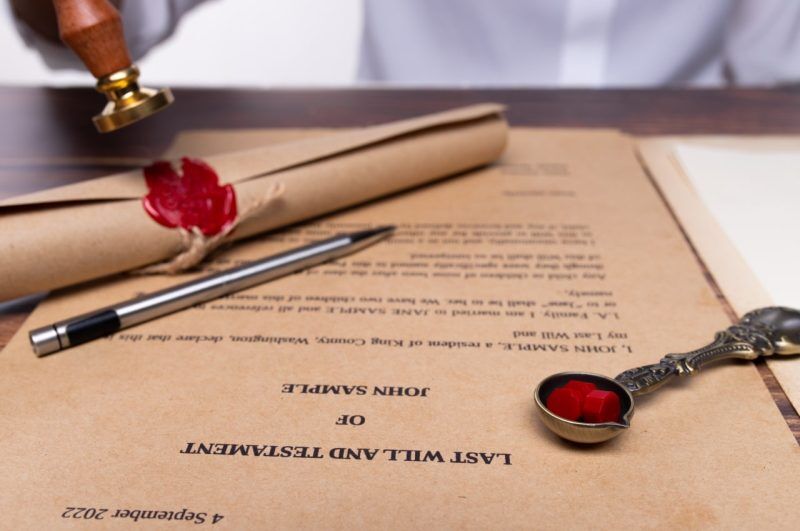Can You Write A Last Will & Testament On Your Own?
Can You Write A Last Will & Testament On Your Own?

Writing your Last Will can be a great way to ensure that your assets are appropriately distributed. However, there are also drawbacks to doing it on your own.
Writing a Last Will and Testament is essential to planning for the future. It is possible to draft a Will without the help of a lawyer. But doing so requires knowledge of the law in your jurisdiction and careful consideration of the various legal options available.

What Is A Last Will & Testament?
A Last Will is a legal document outlining how you would like your belongings and assets to be distributed after death. It provides clarity and direction for how you want things handled, ensuring that your wishes are as followed as possible.
Your Last Will can include anything from the distribution of personal items to real estate or money. Additionally, it can name guardians for children and pets. You can specify an executor who will fulfill your wishes and provide instructions on burial arrangements.
Having a Last Will in place gives you peace of mind knowing that all of these details have been thought through and laid out before you leave this world.
Creating a Last Will also allows you to express gratitude towards any individuals or organizations who have been influential in your life.
Advantages Of Writing Your Last Will & Testament On Your Own
It is essential to recognize the advantages of creating this document for you to feel confident about it.
Creating your own Last Will and Testament allows you to control how assets are distributed upon death. An example includes tangible items such as property and money. It also consists of any donations or trust funds you may like set up for immediate family members or charities.
By writing your own Last Will and Testament, it is possible to avoid family disputes over inheritance and leave nothing up to chance.
Considerations Before Writing
Writing your own Last Will and Testament can be daunting, but you can do it with the correct information and planning. Before starting to write your Will, you should make several essential considerations.
The first is to assess your assets that may need to be divided upon death. These could include money, property, investments, or sentimental items. Knowing exactly what needs to go into the Will is essential for ensuring that all of these items are taken care of when the time comes.
Second, consider who will receive the assets listed in your Will. This includes deciding who inherits any money or property and considering guardianship for any minor children.
While this seems like a lot to consider, you must take your time writing your Will.
Step-By-Step Guide To Writing
By understanding the essential elements of a valid Will, you can ensure your wishes are followed when the time comes. This step-by-step guide is designed to help you get started in the process of writing your own Will and Testament.
Step 1: Gather All Of Your Essential Documents & Information
Before you begin drafting your Last Will and Testament, you’ll need to have all your essential documents and information in one place. This includes:
- Your Social Security Number.
- Your Assets and Property.
- Your Beneficiaries.
- Your Children’s Information.
- Any Named Executors.
Step 2: Choose An Executor
An executor is a person you choose to fulfill your wishes after you die. This person is responsible for managing your estate, paying debts and taxes, and distributing your assets according to your wishes. Be sure to choose someone reliable, trustworthy, and capable of handling the responsibility.
Step 3: Name Your Beneficiaries
Your beneficiaries are the people you want to receive your assets and property after your death. In your Will, you can name both primary beneficiaries and contingent beneficiaries. Primary beneficiaries get the assets first. Contingent beneficiaries will receive them if the primary beneficiaries cannot or do not want to accept them.
Step 4: Draft Your Will
Once you have gathered your essential documents and information and chosen an executor and beneficiaries, you can begin to draft your Will. Be sure to include all of the necessary information that you want to include in the document.
Step 5: Have Your Will Reviewed
After you have drafted your Will, it’s essential to have it reviewed by an attorney. An attorney can ensure that everything is in order and that the document is legally binding. A qualified lawyer will also help ensure that all legal requirements are met so there are no issues later when executing the Will.
Step 6: Sign & Witness Your Will
When writing a Last Will and Testament on your own, the sixth step is to sign and witness your Will. This is an essential part of legally validating the document. All adults signing a Last Will, including witnesses, must be of sound mind to ensure that all parties know what they are signing.
This means that none of them can be under the influence of drugs or alcohol at the time of signing. It also helps if each person has a basic understanding of the document’s contents before signing it.
Two adult witnesses must be present when you sign your Last Will for it to become legally binding. The witnesses should not be named as beneficiaries in the document; otherwise, their testimony will not count toward legal validation.
Step 7: Store Your Will In A Safe Place
When storing your Will, the best place is typically a safety deposit box at your local bank or with another secure organization. This ensures that only you have access and can keep it securely locked away from anyone else’s eyes.
Another option is to give a copy of the document to someone you trust, such as an attorney, family member, or friend who can act as executor of your estate when needed. Scan or photograph the document, making multiple copies available for future reference.
Once your Will is signed and witnessed, store it in a safe place. It’s vital to ensure that your executor and other loved ones know its location.
Potential Risks Of Writing A Last Will On Your Own
There are several risks associated with writing this document without seeking professional advice.
First, it could be difficult for you to ensure that the paper meets all of the requirements for it to be valid according to state law. Please meet these to ensure the document is valid and clear when passing on your estate or possessions.
Additionally, if mistakes are made in wording or dates, it could result in unintended consequences.
The consequences could be dire if you do not correctly write down your wishes in a legally valid document.
It is crucial to ensure that all necessary steps have been taken so that the court does not invalidate your wishes due to improper writing or incorrect information.
Without a valid Will, the distribution of your estate would default to state laws which may not reflect what you wish for you or your beneficiaries. Furthermore, with formal writing of the Will, there could be clarity over who receives what and when they receive it. Portions of your estate are passing into the wrong hands or not being distributed. It is essential to understand the risks involved before making a decision.
Consulting An Attorney
When writing your Last Will and Testament, it is vital to consult an attorney before taking on the task yourself. Writing a Last Will without the help of a qualified lawyer can lead to costly mistakes that may not be reversible, leaving your estate in disarray. You must take the time and get professional advice when dealing with such important legal matters.
An experienced attorney can provide valuable guidance and ensure that your wishes are addressed following state laws.
A lawyer can review your assets and liabilities and advise how best to structure your estate plan. They can draft necessary documents and keep them valid throughout the process. More about our services.
Additionally, they can explain any tax implications or consequences associated with certain decisions so that you make informed decisions.
When To Seek Legal Help
If you have an extensive estate or a large family, seeking help with your Last Will is the best option. An attorney experienced in drafting Wills can ensure that all the necessary steps are taken to create an enforceable document that adheres to state laws.
Additionally, consulting a lawyer is essential if there are any complicated provisions or conditions in your Will, such as trusts, guardianships, or tax issues.
On the other hand, if you have few assets and a small family circle without any complicated provisions, consider writing a Will on your own.
If you are considering writing your own Last Will and Testament, it is essential to seek the help of a qualified attorney. At The Estate Plan, they have the experience and competency to help ensure that your Last Will and Testament are valid and comprehensive.
The Estate Plan offers various services, including estate planning, probate, and Trust administration. Their lawyers are familiar with the laws in Florida and can help you draft a Last Will and Testament that meets your needs.
&
Have questions about how to get started on your estate plan or estate needs?
Have questions about how to get started
on your estate plan or estate needs?
Contact the experienced estate planning professionals at The Estate Plan
by calling us at (305) 677-8489.
Contact the experienced estate planning professionals at The Estate Plan by calling us at
(305) 677-8489.

